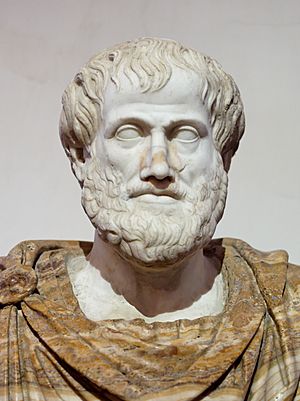Classical unities facts for kids
The classical unities, also known as the Aristotelian unities or three unities, are special rules for writing plays. These ideas come from a famous book called Poetics, written by an ancient Greek thinker named Aristotle. These rules were very important for how plays were created and watched for many centuries.
These three unities helped playwrights (people who write plays) make their stories clear and focused. They were especially popular during the Renaissance period, long after Aristotle lived, when people rediscovered ancient Greek ideas.
Contents
What Are the Three Unities?
Aristotle suggested three main rules to make a play feel real and easy to follow.
Unity of Action
The unity of action means a play should have only one main story or plot. Imagine a play about a hero trying to save their village. This rule says the play should focus on that one big goal. There should be very few, if any, smaller side stories (called subplots). If there are subplots, they must be closely connected to the main story and help it move forward. This keeps the audience from getting confused and helps them understand the main message of the play.
Unity of Place
The unity of place means the entire play should happen in one single location. Think of a play set entirely inside a castle. The characters wouldn't suddenly appear in a different city or a faraway forest in the next scene. The stage should represent just one physical space. This rule made plays feel more realistic because audiences didn't have to imagine characters instantly traveling long distances. It also made it easier for theatre companies, as they didn't need complicated set changes.
Unity of Time
The unity of time means that all the events in a play should take place within a short period, usually no more than 24 hours. So, if a play starts in the morning, it should end by the next morning. This rule helped make the story feel immediate and believable. It prevented plays from jumping forward weeks or months, which could make the audience feel disconnected from the action. It kept the tension high and the story moving quickly.
Who Was Aristotle?
Aristotle was a very important philosopher and scientist who lived in Ancient Greece from 384 to 322 BC. He was a student of Plato and later taught Alexander the Great, one of history's most famous leaders. Aristotle wrote about almost everything: science, logic, ethics, politics, and art. His book Poetics is one of the earliest and most influential works about drama and literary theory. In Poetics, he analyzed Greek tragedies and tried to understand what made them effective and powerful. His ideas about the unities came from his observations of these plays.
Why Were These Rules Important?
For centuries, especially during the Renaissance (a period of great artistic and intellectual growth in Europe, roughly from the 14th to the 17th century), many playwrights and critics believed that following these unities made plays better. They thought these rules helped plays achieve "verisimilitude," which means appearing true or real. If a play felt real, the audience would be more deeply affected by the story and its characters.
These rules also helped to focus the playwright's creativity. Instead of trying to tell a sprawling story over many years and places, they had to concentrate on a single, intense event. This often led to very powerful and dramatic plays.
How Did These Rules Change Over Time?
While the classical unities were very popular for a long time, especially in French theatre during the 17th century, not all playwrights followed them strictly. The famous English playwright William Shakespeare, for example, often ignored the unity of time and place, letting his plays span years and move across many different locations.
Over time, especially during the Romantic period in the 18th and 19th centuries, many artists and writers began to feel that these strict rules limited creativity. They wanted more freedom to tell stories that didn't fit neatly into the unities. Today, playwrights are free to follow or ignore these rules. However, understanding the classical unities still helps us appreciate how plays were written and understood in the past, and how ideas about drama have evolved over centuries.
See also
 In Spanish: Unidades aristotélicas para niños
In Spanish: Unidades aristotélicas para niños
 | Lonnie Johnson |
 | Granville Woods |
 | Lewis Howard Latimer |
 | James West |


